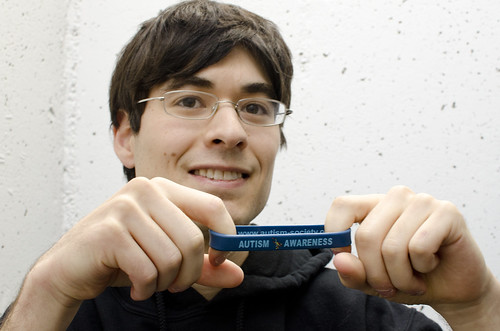
Scott Rich studies hard, is passionate in class and has an encyclopedia of a mind that stores statistics, geographic knowledge and all sorts of trivia, and yet he will never be considered normal by society.
Rich is a 29-year-old SF State graduate student and he has autism. Like many others with mental disorders, people with autism are often misunderstood.
“When people first find out, they are a little surprised because they can’t see it,” Rich said. “There are a lot of misconceptions out there, but the most interesting is that some teachers have been puzzled by it and they say, ‘You seem fine. I don’t see any problems.'”
According to SF State associate professor Pamela Wolfberg, who directs the autism graduate degree program, Autism Spectrum Disorder has different levels of intensity.
“Autism is a developmental neurological condition that typically occurs within the the first three years of life, marked by impairments in the ability to communicate and interact socially, and is marked by the presence of repetitive behaviors or restricted interests,” Wolfberg said. “This is a very misunderstood disorder and where many see this as a deficit, I view as but a difference in learning and a different style of putting information together.”
In the United States, the number of people diagnosed with ASD is increasing drastically: from one in 10,000 children in 1998 to one in every 110 in 2011, according to the National Institute of Neurological Disorders and Stroke.
Children with ASD encounter problems with social interaction and communication and often miss out on play experiences with their peers, which is a vital part of childhood, according to Wolfberg.
Rich’s level of autism is high-functioning, which means he can engage in activities at almost the same capacity of those without it, also known as neuro-typical individuals.
“I’m not that different because my college experience is so much like many other students,” Rich said.
Although through the Americans with Disabilities Act he can receive certain accommodations so as to facilitate learning, Rich says that he by no means receives special treatment.
“There are these accommodations and modifications, but at the college level, it’s important to know you are entitled to accommodations like extended time on exams or a note-taker or recorder in class, but what they can’t modify is a curriculum,” Rich said. “You still have to take the same curriculum as everyone else.”
Autism is sometimes equated with retardation, which is unfair, says Wolfberg.
“People with Autism Spectrum Disorder are not stupid or intellectually-lacking but rather have a different style of putting information together,” Wolfberg said.
Jordan Bishop, a 21-year-old SF State student, watches 17-year-old brother Jeremy whenever he goes back to his family’s home in Kensington, Calif. Jeremy has a more severe form of autism.
“My brother has classic autism where he can’t fully communicate because he is developmentally delayed, but he’s not mentally retarded, though. It does get mistaken for that, but it’s not the same thing because basically all five of your senses are completely heightened to the point of a lot of intensity,” Bishop said. “He’s still intelligent, he just can’t really portray his thoughts to people.”
Jeremy is very much a regular teenager going through high school.
“Aside from the autism, he’s very much the typical 17-year-old kid, you know, he loves video games, he loves watching “Family Guy,” he loves to go to amusement parks, he likes to have fun,” Bishop said.
According to Bishop, his brother has an intelligence that differs from that of neuro-typical people.
“He can still problem solve; he understands basic logic. There are certain things he can do that I can’t do, like he is incredible at word puzzles and he could read before he could talk,” Bishop said. “Autism is sort of a rewiring of the brain, so intelligence is used for just different purposes in the mind than what we’re typically used to.”
It is important for people to know that there is help, said Joe R. Goyos, an education manager for Support For Families of Children with Disabilities, a non-profit San Francisco-based organization that provides services such as phone lines, parent mentors, educational workshops, and frequent support groups.
“Dealing with children and adults with autism is something daunting, and many parents feel that they are by themselves facing a relatively unknown disorder, but that is why it is important for them to know that there’s help out there,” Goyos said. “We offer free services here to all families and children with ASD, but if we don’t have what your child needs then we will help find another place with resources that suffice that need.”
According to Bishop, it is important not to view those with autism as weird or extremely different.
Wolfberg and Bishop both agree that it is important not to be judgmental toward people with ASD when they act in ways outside the norm.
“Most importantly, just be patient,” Wolfberg said. “Make an effort to have understanding and realize that they just want to fit in and be understood.”
Rich also affirms Bishop’s sentiments by adding that having autism is a life-long disorder and that people should strive for awareness of autism.
“Most people see autism as something to be cured,” Rich said. “Be patient and don’t be so quick to judge. Be aware of a disability culture that represents a community of special individuals and we should be respectful of all. We are all people.”



